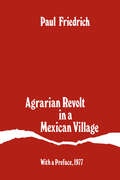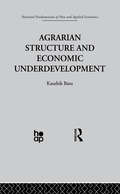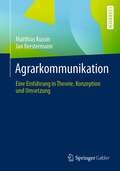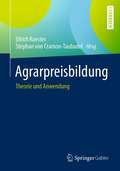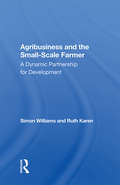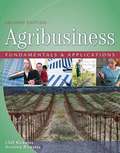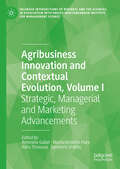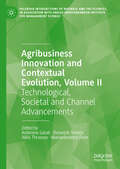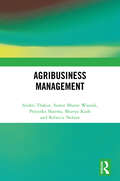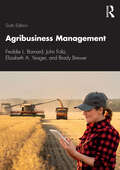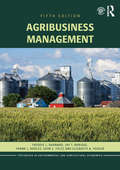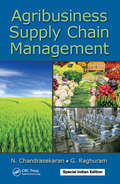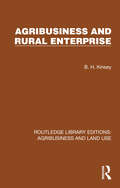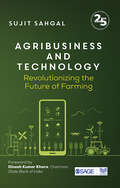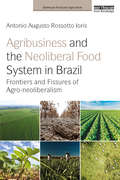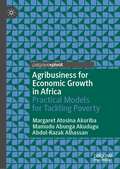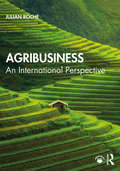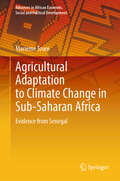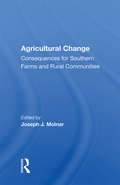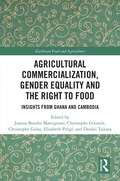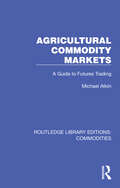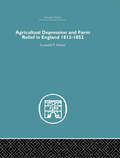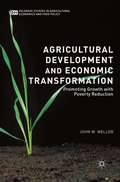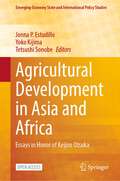- Table View
- List View
Agrarian Revolt in a Mexican Village
by Paul FriedrichAgrarian Revolt in a Mexican Village deals with a Taráscan Indian village in southwestern Mexico which, between 1920 and 1926, played a precedent-setting role in agrarian reform. As he describes forty years in the history of this small pueblo, Paul Friedrich raises general questions about local politics and agrarian reform that are basic to our understanding of radical change in peasant societies around the world. Of particular interest is his detailed study of the colorful, violent, and psychologically complex leader, Primo Tapia, whose biography bears on the theoretical issues of the "political middleman" and the relation between individual motivation and socioeconomic change. Friedrich's evidence includes massive interviewing, personal letters, observations as an anthropological participant (e. g. , in fiesta ritual), analysis of the politics and other village culture during 1955-56, comparison with other Taráscan villages, historical and prehistoric background materials, and research in legal and government agrarian archives.
Agrarian Structure and Economic Underdevelopment
by K. BasuKaushik Basu (Cornell University) explores the relation between agrarian institutions and economic development.
Agrarkommunikation: Eine Einführung in Theorie, Konzeption und Umsetzung
by Matthias Kussin Jan BerstermannTierwohl, Grüne Gentechnik, Hofsterben, biologische Vielfalt: Das Agri- und Foodbusiness steht im hohen Maße im Fokus der Öffentlichkeit. In diesem Buch werden Handlungsmöglichkeiten mit Blick auf die kommunikativen Aufgaben der Branche dargestellt – und dies erstmals auf Basis einschlägiger Ansätze aus den Kommunikationswissenschaften und dem PR-Management. Die Autoren liefern einen Überblick über branchenrelevante Themen wie Nachhaltigkeitskommunikation, Storytelling und Krisenkommunikation sowie ihre Einsatz- und Wirkungsweise im Rahmen einer professionellen Öffentlichkeitsarbeit.
Agrarpreisbildung: Theorie und Anwendung
by Ulrich Koester Stephan von Cramon-TaubadelIn diesem Lehrbuch werden wichtige Bestimmungsfaktoren der Preisbildung auf Märkten sowohl für Agrarprodukte als auch für die landwirtschaftlichen Produktionsfaktoren Boden, Arbeit und Kapital behandelt. Mit Hilfe der speziellen Annahmen der Neoklassik wird gezeigt, wie Agrarpreise entstehen könnten. Dieses Lehrbuch soll dazu beitragen, wie in einer realitätsnahen Analyse von Preisen und deren Änderungen auch die jeweilige Ausprägung von Institutionen und Organisationen einzubeziehen ist. Zahlreiche Beispiele und Übungsaufgaben bieten den Studierenden eine effektive Lernkontrolle.
Agribusiness And The Small-scale Farmer: A Dynamic Partnership For Development
by Simon Williams Ruth KarenBased on case histories from nine Third World countries, this study examines the successful cooperation between private agribusiness firms and small farmers to increase agricultural production and income in developing countries. In such ventures, small farmers are organized around a core private company that buys their output and provides manageria
Agribusiness Fundamentals and Applications
by Cliff Ricketts Kristina RickettsNIMAC-sourced textbook
Agribusiness Innovation and Contextual Evolution, Volume I: Strategic, Managerial and Marketing Advancements (Palgrave Intersections of Business and the Sciences, in association with Gnosis Mediterranean Institute for Management Science)
by Demetris Vrontis Alkis Thrassou Antonino Galati Mariantonietta FioreAgriculture is the oldest and most traditional of economic sectors, and its business has seen major evolutionary leaps over the past century. Contemporary agribusiness is being influenced and reshaped by technological advancements, geopolitical developments, globalisation, transport and logistics innovations, as well as changes in industry structure and consumer behaviour. Reflecting on these changes and providing a deep dive into this sector, this two-volume scientific works’ collection defines, refines, analyses, and prescribes the evolution of agribusiness in the present and future. Taken together, the books offer a comprehensive conceptualisation of the multifactorial macro, micro and organisational elements of agribusiness, including strategic, managerial, marketing, technological and geo-socio-political forces. Volume I explores the strategic, managerial and marketing aspects of contemporary agribusiness, and descriptively and prescriptively investigates the organisational and immediate industry practices and sectoral forces. Topics covered include circular business models, CSR communication practices, digital marketing, organisational sustainability and contemporary farming systems, to name a few..
Agribusiness Innovation and Contextual Evolution, Volume II: Technological, Societal and Channel Advancements (Palgrave Intersections of Business and the Sciences, in association with Gnosis Mediterranean Institute for Management Science)
by Demetris Vrontis Alkis Thrassou Antonino Galati Mariantonietta FioreAgriculture is the oldest and most traditional of economic sectors, and its business has seen major leaps in innovation over the past century. Contemporary agribusiness is being influenced and reshaped by technological developments, geopolitical developments, and globalisation, as well as transport and logistics innovations, changes in consumer behaviour.Reflecting on these changes and providing a deep dive into this sector, this two-volume work defines, refines, analyses, and prescribes the evolution of agribusiness in the present and future. Taken together, the books offer a comprehensive conceptualisation of the multifactorial macro, micro and organisational elements of agribusiness, including strategic, managerial, marketing, technological and geo-socio-political forces.Volume II focuses on the wider, macro-environmental forces acting upon agribusinesses, exploring the contextual evolutions that impact the sector, and the means, practices and avenues for its development.It includes topics such as digital technologies adoption, supply chain sustainability, big data analytics, women’s agricultural entrepreneurship, and simulation model decision making.
Agribusiness Management
by Priyanka Sharma Srishti Thakur Sumit Bharat Wasnik Bhavya Kush Rebecca NelsonThis book serves as a guide to understanding the intricacies and challenges of managing agribusiness enterprises in the modern era. It covers the fundamentals of agribusiness management and discusses the trends and emerging issues. Through real-world case studies and practical examples, this book aims to bridge the gap between theory and practice, enabling the reader to apply their knowledge in diverse agribusiness contexts.Print edition not for sale in South Asia (India, Sri Lanka, Nepal, Bangladesh, Pakistan and Bhutan)
Agribusiness Management
by Elizabeth A. Yeager Freddie L. Barnard John Foltz Brady BrewerThis sixth edition of Agribusiness Management provides students and managers with a fundamental understanding of the key concepts needed to successfully manage agribusinesses in a rapidly changing, high-tech, consumer-oriented, and uncertain world. The text uses four specific approaches to help readers develop and enhance their capabilities as agribusiness managers. First, it offers a contemporary focus that reflects the issues that agribusiness managers face today and are likely to face tomorrow. Second, the book presents conceptual material in a pragmatic way with illustrations and examples that will help the reader understand how a specific concept works in practice. Third, the book has a decision-making emphasis, providing contemporary tools that readers will find useful when making decisions in the contemporary business environment. Finally, Agribusiness Management offers a pertinent set of discussion questions and case studies that will allow the reader to apply the material covered in real-world situations. This edition has been updated throughout with new examples and data, as well as additional material on succession planning and managing human resources. This book is an ideal text for all courses on management in the agribusiness industry. The work is fully supported by a Companion Website which provides users with additional materials such as multiple choice questions, discussion questions, and PowerPoint slides for each chapter.
Agribusiness Management (Routledge Textbooks in Environmental and Agricultural Economics #4)
by Elizabeth A. Yeager Jay T. Akridge Freddie L. Barnard Frank J. Dooley John C. FoltzToday's food and agribusiness managers operate in a rapidly changing, highly volatile, international, high technology, consumer-focused world. Agribusiness Management helps prepare students and managers for a successful career in this new world of food and fiber production and marketing. This text uses four specific approaches to help readers develop and enhance their capabilities as agribusiness managers. First, it offers a contemporary focus that reflects the issues that agribusiness managers face today and are likely to face tomorrow. Second, the book presents conceptual material in a pragmatic way with illustrations and examples that will help the reader understand how a specific concept works in practice. Third, the book has a decision-making emphasis, providing contemporary tools that readers will find useful when making decisions in the contemporary business environment. Finally, Agribusiness Management offers a pertinent set of discussion questions and case studies that will allow the reader to apply the material covered in real-world situations. This fifth edition of Agribusiness Management has been updated throughout and continues to provide students and adult learners with an essential understanding of what it takes to be a successful agribusiness manager in today's rapidly evolving, highly unpredictable marketplace.
Agribusiness Management and Entrepreneurship (Third Edition)
by Michael E. Newman Walter J. WillsAgribusiness Management and Entrepreneurship is intended to fill the need for a basic textbook covering the planning, organizing, and managing of an operation; as well as provide a comprehensive source for those who wish to consider a business from the ownership point of view, specifically as it relates to the vast area of agribusiness.
Agribusiness Supply Chain Management
by N. Chandrasekaran G. RaghuramThe agribusiness supply chain includes a number of processes such as supply management, production management, and demand management to customers through a competitive distribution channel. Each step of the way can be plagued with issues such as diversity of production and demand, bulkiness of produce, perishability, and seasonality. Highlighting t
Agribusiness and Rural Enterprise (Routledge Library Editions: Agribusiness and Land Use #25)
by B. H. KinseyOriginally published in 1987 and now reissued with a new Preface by the author, this book is written primarily for planners, public administrators and project managers in countries or international agencies considering a development strategy in which agribusiness and rural enterprise projects are viewed as a desirable policy instrument for generating employment and income. It makes available the background and methodology of project analysis so that agribusiness and rural enterprise project can be designed, implemented and reviewed effectively in a wide range of circumstances. It outlines how to establish objectively the potential and limitations of agribusiness and rural enterprise projects; provides guidelines for deciding whether a project can be effective; considers the policy issues relating to such projects and suggests techniques for judging project performance.
Agribusiness and Technology: Revolutionizing the Future of Farming
by Sujit SahgalThe future of farming is here. Countries all over the world are racing to revolutionize farming. Indian agricultural sector, however, is facing several challenges and needs a makeover. India should adopt agritech to make farming lucrative on a sustained basis and liberate its farmers. Based on the author’s grassroot level discussions with thousands of farmers, entrepreneurs and policymakers, and a deep study of global trends, Agribusiness and Technology deliberates on the future of farming in India. It takes into consideration the farmers’ views and pain points, and pitches modern methods, best practices, effective business models and the use of technology as the best solution to make farming more lucrative, even for the small farmer. It provides a pathway for an early and impactful adoption of the various solutions. The book will speak to all—social entrepreneurs, venture capital investors, farmers, policymakers and students invested in the Indian agricultural sector and agribusiness.
Agribusiness and the Neoliberal Food System in Brazil: Frontiers and Fissures of Agro-neoliberalism (Earthscan Food and Agriculture)
by Antonio Augusto IorisDue to new production areas and persistent productivity gains, Brazil has consolidated its position as a global leader and even as a ‘model’ of commercial, integrated crop production. The country is now seen as an agricultural powerhouse that has a lot to offer in terms of reducing the prospect of a looming, increasingly global, food crisis. Agribusiness and the Neoliberal Food System in Brazil focuses on the intensification of Brazilian agribusiness as a privileged entry point into the politicised geography of globalised agri-food. Drawing on rich empirical analysis based around three fieldwork campaigns in the state of Mato Grosso, the book examines the connections between farming, markets and the apparatus of the state. The importance of agribusiness expansion within the wider politico-economic context of Brazilian neoliberalism is demonstrated, thus drawing broader conclusions about the main trends of agribusiness in the world today and providing recommendations for future research. This book will be of great interest to students and scholars of agribusiness, neoliberalism and global food production, as well as those interested in Brazil and Latin America more generally.
Agribusiness for Economic Growth in Africa: Practical Models for Tackling Poverty (Palgrave Advances in Bioeconomy: Economics and Policies)
by Abdul-Razak Alhassan Mamudu Abunga Akudugu Margaret Atosina AkuribaThis book provides exclusive information on how agribusinesses could act as the springboard for inclusive economic growth critical for socioeconomic transformation of Africa. It is a must read for academics, practitioners, policymakers, students, and all those interested in the application of practical models capable of tackling the endemic poverty situation in Africa using agribusiness as the launchpad. The book emphasizes the urgent need for robust and inward-looking enabling policy frameworks to help remove existing constraints on agro-industrialization and encourage investments. Thus, the book sets the agenda for the right combination of agricultural, industrial, and trade policies critical in promoting sustainable agricultural commodity value chains and food systems for inclusive growth and poverty reduction. Written in a simple, plain, and accessible language devoid of technical jargons, the book makes an interesting read for even the non-expert and is a valuable reference material for academic and practical training of students and practitioners.
Agribusiness: An International Perspective
by Julian RocheAgribusiness offers a unique introduction to the business of agriculture: what agribusiness is, why it matters, what the role of technology is, how trade fits into the picture, what its key risks are, who is lending and investing and why, and what returns they are getting. It is both practical in orientation – focusing on the role of managers in the industry as well as that of lenders and investors – and international in scope – drawing on case studies and interviews with key figures all over the world. The text ranges across various agricultural commodities to stress that there is no ‘one size fits all’ solution and successful management, lending or investment in agribusiness requires understanding specifics. Readers are introduced to the economics of the supply and demand of food, the role of agricultural trade, agricultural marketing and farm management along with key business aspects including: Main drivers of agribusiness value; Principal risks of agribusinesses; Agribusiness as an investment class; and Agribusiness lending: why, who and how. This engaging textbook offers a complete guide to the international business of agriculture which is ideal for all students, scholars and practitioners. A selection of eResources is also available to supplement this text, and instructors will find PowerPoint slides, discussion questions, case studies and further teaching materials available to them.
Agricultural Adaptation to Climate Change in Sub-Saharan Africa: Evidence from Senegal (Advances in African Economic, Social and Political Development)
by Marieme ToureIn the light of the impact of extreme weather events, declining agricultural productivity and child malnutrition in sub-Saharan Africa, this book explores the potential for sustainable agriculture to better respond to climate-related threats. By presenting a case study of Senegal, the author offers insights into the impact of climate change on long-term crop production, food security, and child malnutrition. Furthermore, the study sheds new light on the financialization of agricultural production and foreign direct investments, discusses policy instruments and adaptation strategies for implementing sustainable agriculture, and highlights the role of green financing instruments to enable the harmonization of private financing and green infrastructure. It will appeal to scholars of agricultural and development economics, and anyone interested in climate risk mitigation strategies and sustainable agriculture to achieve a green transition in sub-Saharan Africa.
Agricultural Change: Consequences For Southern Farms And Rural Communities
by Joseph J. MolnarThis book examines the impact of the rise and fall of new commodities, production technologies, and shifting government policies on individuals and farm families in the rural South and the interrelationship between agricultural change and community change.
Agricultural Commercialization, Gender Equality and the Right to Food: Insights from Ghana and Cambodia (Earthscan Food and Agriculture)
by Christophe Golay Elisabeth Prügl Joanna Bourke Martignoni Christophe Gironde Dzodzi TsikataThis volume explores agricultural commercialization from a gender equality and right to food perspective. Agricultural commercialization, involving not only the shift to selling crops and buying inputs but also the commodification of land and labour, has always been controversial. Strategies for commercialization have often reinforced and exacerbated inequalities, been blind to gender differences and given rise to violations of the human rights to food, land, work and social security. While there is a body of evidence to trace these developments globally, impacts vary considerably in local contexts. This book systematically considers these dynamics in two countries, Cambodia and Ghana. Profoundly different in terms of their history and location, they provide the basis for fruitful comparisons because they both transitioned to democracy in the early 1990s, made agricultural development a priority, and adopted orthodox policies of commercialization to develop the sector. Chapters illustrate how commercialization processes are gendered, highlighting distinctive gender, ethnic and class dynamics in rural Ghana and Cambodia and the different outcomes these generate. They also show the ways in which food cultures are changing and the often-problematic impact of these changes on the safety and quality of food. Specific policies and legal norms are examined, with chapters addressing the development and implementation of frameworks on the right to food and land administration. Overall, the volume brings into relief multiple dimensions shaping the outcomes of processes of commercialization, including gender orders, food cultures, policy translation, national and sub-national policies, corporate investments and programmes, and formal and informal legal norms. In doing so, it offers insight not only on our case countries, but also provides proposals to advance rights-based research on food security. This book will be of great interest to students and scholars of food security, agricultural development and economics, gender, human rights and sustainable development.
Agricultural Commodity Markets: A Guide to Futures Trading (Routledge Library Editions: Commodities #2)
by Michael AtkinOriginally published in 1989, this book is a clear and thorough guide to the workings and purpose of the futures markets. It begins by explaining the role of futures and options in agriculture and their uses in reducing risks and maximizing profits. The state of the futures industry in the USA, Europe, Japan and the smaller exchanges elsewhere during the 1980s is examined, the pattern of price movements analysed, and the major background factors which influence price movements discussed. The regulatory environment in the US and UK is analysed, and there is a thorough explanation of fundamental and technical approaches to price forecasting and of strategies to maximize profits from trading. Detailed profiles of the major agricultural commodities traded on futures markets comprise the second part of this comprehensive handbook. The major markets, price movements, and trading opportunities are outlined for each commodity in turn. The book concludes by discussing the contemporary issues facing futures trading, and the role of the markets in the agricultural trade of developing countries.
Agricultural Depression and Farm Relief in England 1813-1852
by Leonard P. AdamsThis book was first published in 1932.
Agricultural Development and Economic Transformation: Promoting Growth with Poverty Reduction (Palgrave Studies in Agricultural Economics and Food Policy)
by John W. MellorThis book examines the role of agriculture in the economic transformation of developing low- and middle-income countries and explores means for accelerating agricultural growth and poverty reduction. In this volume, Mellor measures by household class the employment impact of alternative agricultural growth rates and land tenure systems, and impact on cereal consumption and food security. The book provides detailed analysis of each element of agricultural modernization, emphasizing the central role of government in accelerated growth in private sector dominated agriculture. The book differs from the bulk of current conventional wisdom in its placement of the non-poor small commercial farmer at the center of growth, and explains how growth translates into poverty reduction. This new book is a follow up to Mellor's classic, prize-winning text, The Economics of Agricultural Development.
Agricultural Development in Asia and Africa: Essays in Honor of Keijiro Otsuka (Emerging-Economy State and International Policy Studies)
by Tetsushi Sonobe Jonna P. Estudillo Yoko KijimaThis Open Access book explores the multifaceted nature of agricultural and rural development in Asia and examines the extent to which the Asian experience is being replicated in contemporary Africa. This volume compiles the works of top scholars who provided analyses and evidences from household-level surveys collected for many years in several parts of Asia and Africa. The most important finding presented in this book is that African agricultural development has evolved following the pathways of Asian agricultural development. The common pathways are borrowed technology from abroad and adaptive research in rice farming; secured property rights on natural resources; adoption of ICTs; investments in human capital, including training; and launching of the high-value agriculture. In both continents, agricultural development started in the crop sector, which had a strong tendency to induce the dynamic development of other sectors in rural areas.
